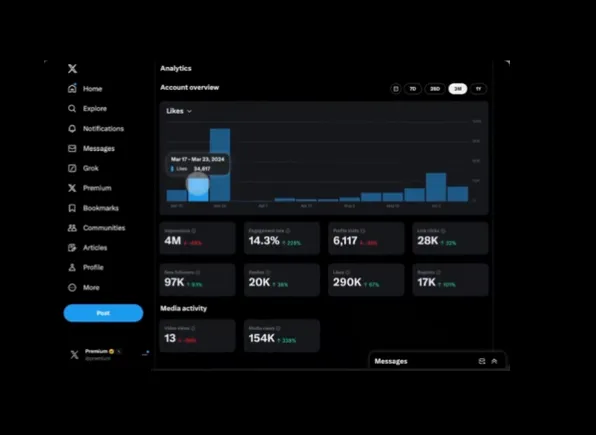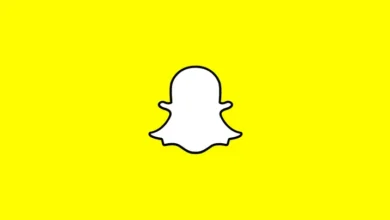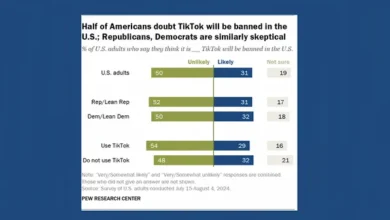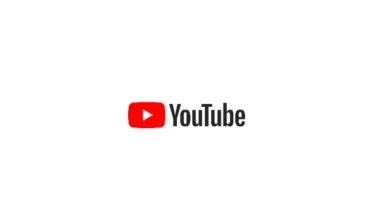
X’s new and improved profile analytics element is here, with X Premium subscribers now able to access more specific insight into their performance, with data on total impressions, engagement rate, profile visits, video performance, link clicks and more.
As you can see, the updated X analytics is built around a large new bar chart display that you can change to highlight different elements, making it easier to view performance over time. You can also switch the date ranges along the top of the chart.
To be clear, most of the actual insights here have been available to X/Twitter users for a long time, but the presentation has been updated to make it easier to dig into the details in the app. X has also added some more specific data points, which will be helpful for analyzing your platform performance over time.
Actually, I should say that X users “had” been able to access similar analytics. With the arrival of the new analytics dashboard, it seems that all account analytics have now become paid only.
Now, when you try to log into analytics.twitter.com, you get a pop-up prompt alerting you that you need to sign-up to X Premium to access this element.

X had still enabled users to access its analytics features, up until last week, but its analytics platform wasn’t being maintained as it worked on the new upgrade.
And now, you can only access analytics if you pay, slipping another element behind a paywall, and adding another incentive into X’s subscription drive.
So, will that get more people to sign up?
Look, there definitely is a level of value in X’s Premium upgrades, particularly in regard to XPro access (formerly TweetDeck) and now its account analytics. If you’re a business that’s looking to grow your X following, then it may well be worth the investment, yet, at the same time, X’s own marketing and promotion efforts for its Premium add-ons haven’t been great.
When Elon Musk initially took over X in late 2022, he announced a grand plan to drive a massive uptake in platform subscriptions, with a short-term target of the platform bringing in 50% of its total revenue from this element.
That would serve two critical purposes, both in reducing the platform’s reliance on ad revenue, thereby giving it more freedom to make up its own rules on moderation (as opposed to being held to standards set by ad partners), while also bringing in more revenue for that struggling business. This, combined with massive cost cuts, was a key element of Musk’s Twitter reformation plan.
But now, 18 months in, it’s not even close to reaching its subscription targets.
Part of the problem, at least initially, is that Elon and Co. focused on selling blue checkmarks as a key component of its subscription offering, which also, eventually, saw X remove checkmarks from non-paying users.
But selling blue ticks has seemingly had the opposite effect. Rather than users seeing this as a benefit, a lot now don’t even want a checkmark at all, with what was once the most vaunted signifier in the app becoming largely meaningless, or worse. Musk’s changes and personal stances have been so divisive that many simply don’t want any potential association, while celebrities are now also seeking to avoid the implication that they might be paying for a marker of false credibility.
Really, Elon should have focused on these business add-ons all along, which is something that I noted back November 2022, a month after he took ownership. At that time, I detailed the market opportunity of pitching advanced analytics and scheduling tools directly integrated into the app.
“Various third-party tools include in-depth competitor analysis and performance tracking, which you can’t get on Twitter itself, while management platforms like Hootsuite, which has over 200k paying subscribers, are largely used for tweet scheduling.”
That’s a more viable, and sustainable opportunity, which X now seems to be realizing, but it’s actually eroded the value of its subscription offerings by taking the wrong approach in the first place.
Well, that and Elon’s continued antagonism of anyone and anything that he sees as a possible impediment to his success. Including the platform’s ad partners.
So, will businesses pay?
With a lot fewer advertisers, and seemingly reduced influence and engagement, it’s hard to see this being a big winner. But again, there is value in these offerings, and if you’re target audience is active in the app, it’s worth considering.
X also says that it will “ship more capabilities to help creators” glean insight into their platform efforts soon.
It’ll be interesting to see what those extras will be.




